|
|
|
Sort Order |
|
|
|
Items / Page
|
|
|
|
|
|
|
| Srl | Item |
| 1 |
ID:
158934
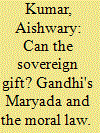

|
|
|
|
|
| Summary/Abstract |
Comment on Skaria, Ajay. 2016. Unconditional Equality: Gandhi’s Religion of Resistance. Minneapolis: University of Minnesota Press.
|
|
|
|
|
|
|
|
|
|
|
|
|
|
|
|
| 2 |
ID:
158931
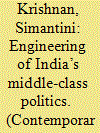

|
|
|
|
|
| Summary/Abstract |
Engineering education at the service of economic growth has long been regarded as a policy imperative for developing countries. This paper offers a theoretical analysis of how the ascendancy of engineering education, particularly in post-liberalization India, has played a role in consolidating middle-class narratives of economic liberalism and social conservatism. It shows how a focus on apolitical problem-solving in engineering disciplines can feed into hegemonic discourses on apolitical good governance and meritocracy, propagated by political parties such as the ruling BJP. This assumes significance in light of recent comparative scholarship that educated and professionally oriented middle classes in India and other developing countries, unlike their Western counterparts, tend to be socially illiberal and politically authoritarian.
|
|
|
|
|
|
|
|
|
|
|
|
|
|
|
|
| 3 |
ID:
158936


|
|
|
|
|
| Summary/Abstract |
Comment on Skaria, Ajay. 2016. Unconditional Equality: Gandhi's Religion of Resistance. Minneapolis: University of Minnesota Press
|
|
|
|
|
|
|
|
|
|
|
|
|
|
|
|
| 4 |
ID:
158930
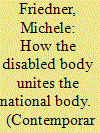

|
|
|
|
|
| Summary/Abstract |
This article analyzes both representations of disability in popular media and the role of disabled workers in urban India and demonstrates how the category of disability becomes a form of non-threatening ‘feel good’ diversity. Unlike other axes of difference such as class, caste, gender, sexuality, and religion, India’s disability rights movement, corporations, and mainstream media represent disability as largely apolitical. Drawing on Nehruvian ideals about ‘unity in diversity’, this article discusses how disability functions as a means of imagining and creating unity in India. As a result of skillful manipulation that collapses and conflates nationalist and neoliberal projects, the success of disabled people is considered to be synonymous with the success of the nation. This essay thus examines how thinking, feeling, and representing through disability provides a new way of conceptualizing the nation and critically engages with ideas and ideals of ‘disability publics’. Disability is rendered into a representation and while tension exists between feeling good and feeling bad, the specter of a contentious disability politics is kept at bay.
|
|
|
|
|
|
|
|
|
|
|
|
|
|
|
|
| 5 |
ID:
158937
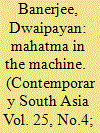

|
|
|
|
|
| Summary/Abstract |
Comment on Skaria, Ajay. 2016. Unconditional Equality: Gandhi's Religion of Resistance. Minneapolis: University of Minnesota Press.
|
|
|
|
|
|
|
|
|
|
|
|
|
|
|
|
| 6 |
ID:
158932
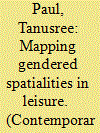

|
|
|
|
|
| Summary/Abstract |
The subject of ‘leisure’, although extensively studied by scholars of multiple disciplines, has often lacked systematic theorization, so far as gendered spatialities are concerned. This paper attempts to address this gap by exploring how space and place relate to gendered leisure practices. Based on a primary survey in the city of Kolkata, India, this paper explores both the place-specific conditions and the person-specific experiences of leisure in the context of new consumption spaces (NCSs). The paper observes that, although these spaces have provided women with new ‘freedom’ to stroll around in public spaces by providing ‘safe’ and ‘civil’ environs, one should refrain from an unproblematic interpretation of this freedom. This is because the usual constraints on women’s leisure continue to apply, even as they ‘freely’ engage with NCSs to spend their leisure time. Local cultural specificities get invested within these ‘global’ spaces and continue to define the ‘appropriateness’ of place, time, and company for women to be enjoying their leisure in their own right. Thus, these spaces actively participate in the reproduction of existential gendered realities and lived experiences, albeit tacitly.
|
|
|
|
|
|
|
|
|
|
|
|
|
|
|
|
| 7 |
ID:
158938
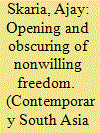

|
|
|
|
|
| Summary/Abstract |
A response from the author to the views expressed by Dwaipayan Banerjee, Prathama Banerjee, Aishwary Kumar, and Uday Singh Mehta in their reviews of Unconditional Equality.
|
|
|
|
|
|
|
|
|
|
|
|
|
|
|
|
| 8 |
ID:
158933
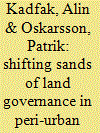

|
|
|
|
|
| Summary/Abstract |
This article examines how unstable land on a sandy peninsula in peri-urban Mangaluru becomes part of urban land contestation to primarily support continued informal tenure. The peninsula is undergoing shifts changing both its shape and land use under the influence of a range of biophysical and human forces. For the time being, fisherfolk can remain in place despite lacking land documents, but much of the peninsula has been proposed for commercial development projects. The sand-spit thus becomes a frontier for variegated land claims part of urbanization processes where the variable ‘nature’ of land is enmeshed. Drawing on urban political ecology and Indian land governance literature, the article highlights how the fluctuating land supports continued informality since the shifting sands make boundaries challenging to delimit and maintain, and, once stabilised, can be claimed by the state. The informalising characteristics of land, understood as an ‘informality machine’, reinforces similar ongoing urban transformations along the entire coastline, to mainly favour elite interests, but can also be seized upon by the fisherfolk themselves for new claims, or workarounds aimed at securing long-term tenure. Future research on the urban land question would do well to include a perspective of land as co-constituted by socio-natural processes.
|
|
|
|
|
|
|
|
|
|
|
|
|
|
|
|
| 9 |
ID:
158929
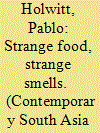

|
|
|
|
|
| Summary/Abstract |
This paper inquires into the meaning of food – specifically of food smells – for issues of urban citizenship in the context of urban renewal in Mumbai. The city’s southern neighbourhoods are currently being transformed by a process of chawl-redevelopment. Chawl-redevelopment is the primary governmental tool to open these areas up for new residential developments by demolishing old structures and constructing new high-rise enclaves for the rich, while simultaneously promising to provide in situ rehousing to the old, lower middle-class residents. A common feature of these new building complexes is that the most prestigious and luxurious new apartments are sold exclusively to vegetarians. While segregation between vegetarians and non-vegetarians in the real estate market is anything but a new phenomenon in Indian cities, I argue that both popular understandings of this practice and scholarly debates about citizenship fall short of grasping its complexity by essentializing affects or effects of food-based exclusion. Using the concept of sensorial citizenship, the paper analyses the mutual relation between rights and aesthetics in order to understand issues of exclusion and belonging in the contemporary Indian metropolis.
|
|
|
|
|
|
|
|
|
|
|
|
|
|
|
|
| 10 |
ID:
158935


|
|
|
|
|
| Summary/Abstract |
Comment on Skaria, Ajay. 2016. Unconditional Equality: Gandhi’s Religion of Resistance. Minneapolis: University of Minnesota Press.
|
|
|
|
|
|
|
|
|
|
|
|
|
|
|
|
|
|
|
|
|